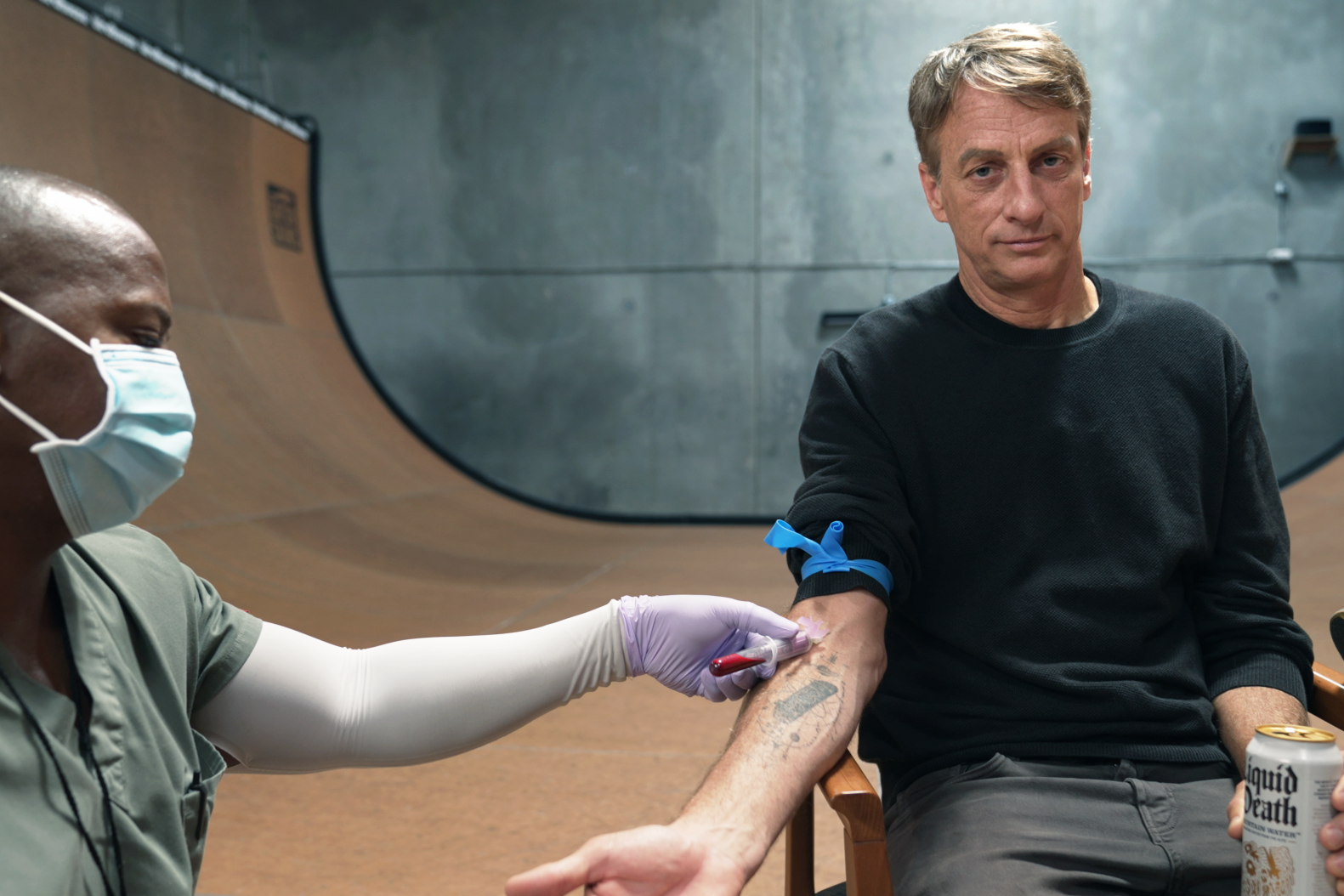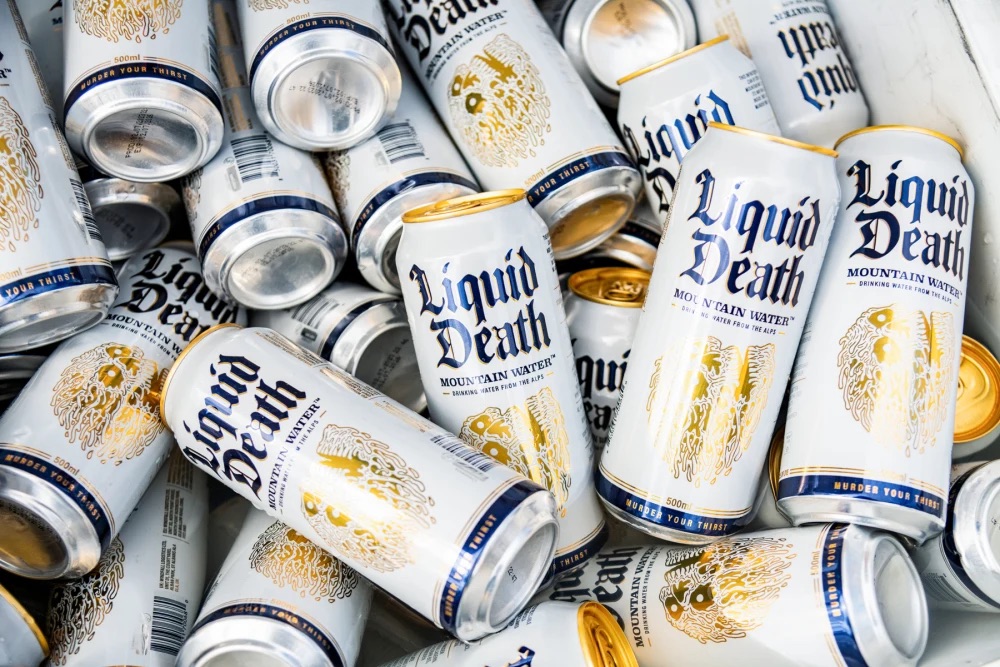You may recognise this brand. Launched in 2019, this isn’t your typical bottled water brand. It’s loud, unapologetic, and taps into a rebellious energy you wouldn’t expect from, well… water. Here we are, talking about Liquid Death like it’s a lifestyle icon.
From the get-go, Liquid Death set out to disrupt the industry with its tallboy cans, gothic skull logo, and irreverent slogan “Murder Your Thirst”. They took a product as basic as water and made it into something edgy, cool, and (most importantly) talkable.
For Liquid Death, the mission was clear: make water fun and appeal to the counterculture. Think heavy metal fans, punks, and Gen Zers who love to share iconic, unexpected brands online. This brand wasn’t built for everyone, and that’s exactly the point. When you’re marketing a product in a saturated space, differentiation is everything. Liquid Death didn’t just sell water: they sold an identity.
That alone is a lesson every marketer should take note of: it’s not what you sell, it’s how you position it.
Brand Positioning and Market Disruption
Liquid Death flipped the script on traditional water branding by positioning itself as the rebellious outsider in an industry dominated by serene, nature-inspired labels. Forget soft blues and crystal-clear mountain streams. In fact, a big part of the differentiator is how Liquid Death went full metal with a skull logo, gothic fonts, and a tagline that practically dares you to look twice: “Murder Your Thirst.”
It’s for people who want to make a statement, whether they’re at a festival or just holding a can during a meeting. By aligning with the counterculture, Liquid Death attracts millennials and Gen Z consumers who crave brands that reflect their values: fun, individuality, and a little bit of chaos.
“We want to work with people that you think are unexpected for a brand called Liquid Death. We just like to have fun with this perception of who [our] customer is; it’s not just tattooed metalheads, it’s gamers, moms and skateboarders. It really runs the gamut.”
Gregg Fass – Liquid Death’s VP of Marketing, Campaign Asia
Jeff Slater at the Marketing Sage aptly described how Liquid Death addressed a previously unaddressed target audience. This understanding of their audience is central to Liquid Death’s strategy, and their commitment to appealing to their audience’s sense of humour shines through in all content.
Creative Content and Collaborations
Liquid Death produces original content beyond traditional ads including animated videos, comics and songs.
This entertainment-focused approach aims to provide value beyond just selling water, making the brand more engaging for its target audience.

Also, the brand cleverly capitalised on scarcity and FOMO by dropping limited-edition products, from casket coolers to skateboards with Tony Hawk’s blood. Moreover, these stunts don’t just grab attention. They create an emotional connection, turning fans into superfans.
Standing out doesn’t mean being everything to everyone. Find your tribe, lean into what makes your brand unique, and don’t be afraid to push boundaries.
Creative Marketing and Virality
Liquid Death has proven that when it comes to making water unforgettable, creativity (and a bit of shock value) go a long way. Their marketing campaigns read more like mini blockbusters than ads, with each one dialling up the irreverence and hilarity.

Whether it’s a Super Bowl spot featuring kids at a party “chugging” Liquid Death cans to a hard rock soundtrack or a series of social media stunts that make you laugh, they know exactly how to make their product the centre of a conversation.
Their genius lies in understanding that today’s audience doesn’t just want ads: they want to be entertained. And entertain they do! Liquid Death treats their marketing team like a comedy troupe, churning out skits, collabs, and limited releases that keep their followers coming back.
Liquid Death on Social Media
On social media, Liquid Death is a masterclass in keeping things fresh and engaging. With millions of followers on TikTok and Instagram, their feed is a mix of bizarre humour, fan interactions, and sometimes even mock-rivalries with other brands. They’ve tapped into a tone that’s unfiltered and feels authentic, breaking through the typical “brand speak” we’re so used to scrolling past.
“What it comes down to is we have these ideas that other people would never try. They’d think, ‘no way a client would ever approve of this’, or ‘our CEO will shut it down’. Those ideas never get to see the light of day — but at Liquid Death, we’ve created a culture where we celebrate those ideas and go forward with them.”
Gregg Fass – Liquid Death’s VP of Marketing, Hubspot
Spotlight on Video Storytelling
Liquid Death’s forte is their video content, ranging from short adverts to near feature-length films. And let the record show, they’re absolutely slaying it. Their film Dead Til Death is a love letter to ’90s slasher flicks, packed with delightfully on-the-nose horror clichés. The plot? Cans of Liquid Death hunting down litter-dropping campers—it’s as campy and ridiculous as any B-movie could hope to be.
The film bluntly reveals the truth about plastic recycling. Less than 10% of plastic actually gets recycled because it’s not economically viable. Companies often ship plastic waste to other countries, which can’t handle it all. This leads to plastic being dumped in landfills or oceans. “Dead Til Death” shows this harsh reality, which is unusual and refreshing for an ad.
For marketers, Liquid Death’s approach highlights the power of creating a brand that doesn’t just advertise but entertains. By meeting their audience where they are (and giving them content worth talking about), they’ve built more than a customer base: they’ve built a fandom.
Brand Health Metrics and Conversion Challenges
For all the buzz Liquid Death has stirred up, the real question lingers: are people actually drinking it? Here’s where things get interesting.
Despite their off-the-charts awareness, Liquid Death faces a unique challenge, which is converting fans of their brand into fans of their product.
Let’s break it down thanks to this article from Tracksuit: in the U.S., Liquid Death’s awareness shot up to 34%, which is chef’s kiss impressive for a relatively new brand.
But when it comes to turning that awareness into actual purchases, they hit some roadblocks. Their top-of-funnel conversion (from awareness to consideration) hovers at 41%, a bit shy of competitors like FIJI at 57%.
And the bottom-of-funnel conversion (consideration to preference) sits around 21%, under the category average. This gap between brand love and product purchase suggests they might be so good at “the hype” that people almost forget it’s… just water.
One theory? Liquid Death’s focus on being an entertainment powerhouse sometimes overshadows the product itself. People adore the brand’s antics, but that doesn’t always translate to cart checkouts. While fans buy into the brand vibe, fewer are prioritising it when they actually need a drink.
Creating a beloved brand doesn’t always guarantee product loyalty. Liquid Death’s strategy is a wild ride, but it shows that balancing personality with a strong product story is key to ensuring that hype leads to long-term loyalty.
Challenger Brand Status and Lessons for Marketers
As a challenger brand, Liquid Death has leaned hard into what makes them different. Their irreverence is magnetic, drawing in a crowd that loves their rule-breaking attitude. And let’s face it, they’re a breath of fresh air in a category usually filled with brands trying to look pure, clean, and nature-inspired.
But with that rebellious positioning comes the challenge of staying fresh and relevant. Can they keep the hype alive, or will they become a fad that fades as quickly as it rose?
- Know your tribe and cater to them without trying to please everyone. By embracing their niche they’ve built a brand that feels like a movement. But niche marketing requires constant creativity and a tight grip on brand values. Stray too far from the core, and they risk alienating the very crowd that made them famous.
- In a world of safe plays, being unapologetically bold can pay off, but you’ve got to keep the momentum going. Standing out is only half the battle. Staying relevant, doubling down on your core audience, and avoiding the temptation to go mainstream are the keys to building a brand that becomes a movement.
In the end, Liquid Death’s story isn’t just about selling water. It’s about building a brand that disrupts, entertains, and, most importantly, makes people feel something. And that’s the kind of marketing that truly lasts.
Want more? Here's your invitation from the school ⤵️
We don’t teach you how to do more. We teach you how to do it better.
You don’t need more hacks. You need smarter foundations, better systems, and clarity that cuts through the noise.You got into this to make a difference. Let’s help you do that, with strategy and a whole lotta heart.
➡️ Find out how we can help via our all-access pass.



